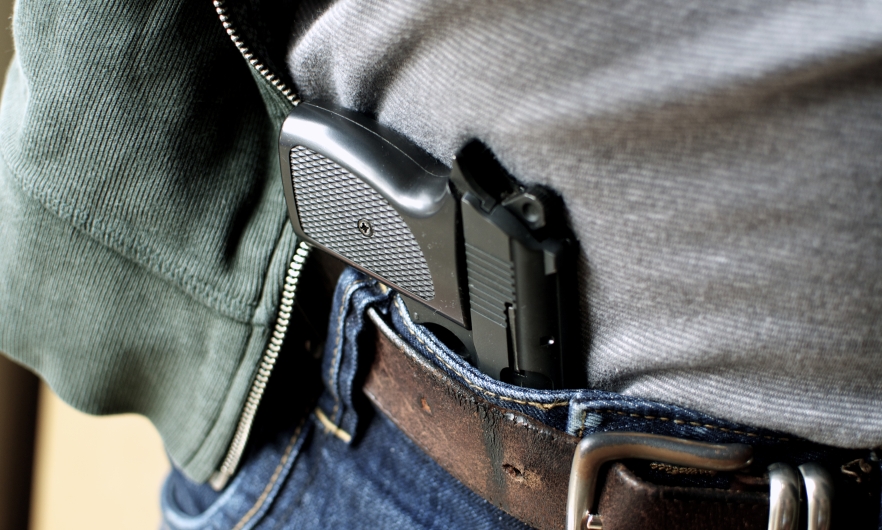Study Finds That Dropping Training Requirement to Obtain Concealed Carry Permit Leads to Significant Increase in Gun Assaults
Study comes as last year’s Bruen Supreme Court decision forces several states to loosen concealed carry permitting laws.

An analysis of 11 states that removed concealed carry licensing that mandated firearm training or proficiency requirements suggests that rates of violent gun assaults increase 32 percent, according to a new study led by researchers at the Johns Hopkins Center for Gun Violence Solutions at the Bloomberg School of Public Health.
The study examined 11 states that moved from requiring purchasers to demonstrate a need for a permit for a concealed weapon–known as shall issue laws–to permitless concealed laws. In some states, shall issue laws require permittees to undergo live firearm training, minimum hours at a firing range, or proficiency (e.g. hitting a designated target with 70 percent of their shots). Some shall issue states also prohibit those with violent misdemeanor convictions from obtaining permits.
When the 11 states with shall issue licensing laws that require safety training for obtaining a concealed carry permit went to permitless concealed carry, the annual rate of assaults with guns increased by 21 per 100,000. Some statistical models also found significant increases in assaults with guns when states dropped provisions that prohibited those convicted of violent misdemeanors from obtaining concealed carry permits.
The findings were published September 19, 2023 in Criminology and Public Policy.
“When states made it easier for potentially untrained gun owners to carry their weapons in public, assaults with guns increased,” said Cassandra Crifasi, PhD, co-director of the Johns Hopkins Center for Gun Violence Solutions at the Bloomberg School. “While the Supreme Court’s Bruen decision is forcing some states to weaken their concealed carry permitting systems, this study shows that states can reduce the expected increase in gun assault rates by including training requirements.”
For their analysis, the researchers used data from the Federal Bureau of Investigation’s Uniform Crime Reports and the Centers for Disease Control and Prevention’s Web-based Injury Statistic Query and Reporting Systems as well as the CDC’s National Center for Health Statistics. The researchers identified state laws using databases and by reviewing the state’s legislative history.
The 11 states in the analysis are: Alaska, Arizona, Idaho, Kansas, Maine, Mississippi, Missouri, New Hampshire, North Dakota, West Virginia, and Wyoming.
The researchers used advanced statistical modeling to compare states that changed their concealed carry permitting laws with states that had not changed them. Rates of violent crime for each of the eleven states that removed requirements to obtain licenses to carry concealed guns in public in the analysis were compared to the best “synthetic controls”—predicted crime rates derived from data from other states that had restrictive permitting requirements in place throughout the study period.
Twenty-seven states currently allow for the permitless carry of a concealed weapon and 17 states issue permits on a shall issue basis. State laws have loosened over the last 40 years; as recently as 1981, 21 states prohibited any form of concealed carry.
The study comes against the backdrop of the Bruen U.S. Supreme Court decision in July 2022 that found New York’s state law requiring that permittees have a proper cause or special need to obtain a concealed carry weapons permit as unconstitutional (commonly called may issue permits). Laws with proper cause requirements in other states, including California, Hawaii, Maryland, Massachusetts, and New Jersey, have been revised or are under review. The decision is forcing states with may issue permitting to move to shall issue or permitless systems.
“This study shows that making the concealed carry permitting process more rigorous can have a major impact on public safety,” said Daniel Webster, ScD, MPH, Bloomberg Professor of American Health and Distinguished Research Scholar at the Center for Gun Violence Solutions at the Bloomberg School. “This study is unique in that it analyzes specific provisions to concealed carry laws to identify which are most effective in avoiding harmful outcomes from expanding concealed carry licensing.”
The study was supported by the New Venture Fund and the Joyce Foundation.
# # #
